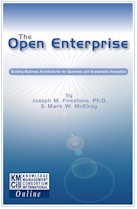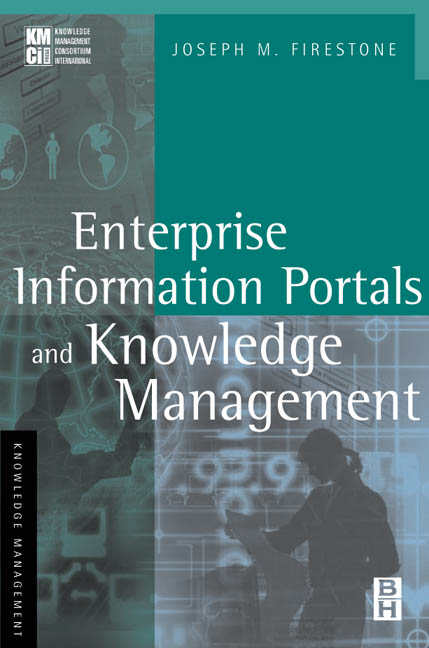Executive Information Systems, Inc.
Home of The New Knowledge Management, The Open Enterprise, and The EKP
EIS, Macroinnovation, and KMCI collaborate to introduce KMCI's new KM Strategy and Methodology (K-STREAM™) emphasis in introductory CKIM Workshop. Details . .
Papers and presentations available as free downloads
EIS produces occasional White Papers and Working Papers on various topics it finds of interest to Knowledge Management (KM), Enterprise Information and Knowledge Portals, The New Knowledge Management, The Open Enterprise, the development of Distributed Knowledge Management Systems (DKMS), Data Warehousing, Data Mining, and OLAP. In addition, EIS produces an on-going series of brief columns on DKMS and Data Warehousing-related issues, and, of course, conference presentations. The papers, briefs, and presentations are listed and categorized below, and links are provided to an abstract page for the Data Warehouse/OLAP, KM, or Professional Papers category.
Or, if you want to see the abstracts first, you can link from each of the abstract page links provided further down on this page and at the top.
See Joe Firestone's blog "All Life Is Problem Solving."
Books
The goal of this serialized on-line book is to provide an organizational solution to problems of adaptation and corporate corruption. The book introduces a prescriptive model called The Open Enterprise. The Open Enterprise is a "social architecture for openness", as well as an engine for sustainable innovation. It is prescriptive in that it specifies a specific end-state vision for Knowledge Management strategy. It is a type of organization optimized for open and distributed knowledge processing and problem-solving, sustainable innovation and adaptation, and for internal organizational transparency and inclusiveness in knowledge processing, heightening both employee participation and stockholder democracy. Knowledge Management sorely needs a prescriptive model of this sort, and in providing it the book addresses the issues just mentioned, and also provides an entirely novel framework for Knowledge Management strategy. Moreover, the book shows that Knowledge Management is uniquely qualified to address issues related to business innovation and corporate corruption, using the control and management of Knowledge Processing rules as a lever for doing so. And all this, the book argues, can be achieved without undermining or compromising the authority of managers to organize and direct the affairs of the enterprise as they see fit.
Joseph M. Firestone and Mark W. McElroy, Excerpt from The Open Enterprise: Building Business Architectures for Openness and Sustainable Innovation, Hartland Four Corners, VT: KMCI Online Press, 2003
Download it Free!Thus, the objective of KM strategy according to the New Knowledge Management now becomes the attainment and maintenance of The Open Enterprise. And the goals of KM – enhancing innovation, adaptation, knowledge sharing, transparency, competitive advantage, performance and effectiveness – flow from fulfillment of this objective. So, the Open Enterprise orientation being developed in this book has the potential to redirect all of KM and to enhance its value propositions far beyond the constraints of first-generation knowledge-sharing and the IT applications aimed at supporting it.
Joseph M. Firestone and Mark W. McElroy, Key
Issues in the New Knowledge Management, Burlington, MA: KMCI Press/Butterworth-Heinemann, 2003
Buy It!When was the last time you saw a careful, well-documented discussion of the character of knowledge? Or a comprehensive treatment of the difference between Knowledge Management and Information Management? Or a systematic discussion of how knowledge claims are tested and evaluated. Key Issues is the first book to take an issues-oriented approach to the central concerns of Knowledge Management. It is also a pivotal book in the development of The New Knowledge Management paradigm because it demonstrates its ability to do what a new paradigm must. Namely, illuminate in novel ways a wide variety of problems in the field it addresses. The problems addressed in Key Issues are: The Knowledge Conundrum, Origins of the Knowledge Life Cycle, The Distinction Between Information Management and Knowledge Management, Generational Change in Knowledge Management, Knowledge Claim Evaluation: the Forgotten Factor in Knowledge Production, Knowledge Life Cycle Framework Applications, Best Practices Systems and KM, What Comes First? KM or Strategy? The Role of Culture in KM, Intellectual Capital and Social Innovation Capital, and The Future Of Knowledge Management. Every one of these is central to Knowledge Management and its further development, and every one is treated carefully in this unique book. Key Issues is the first volume of a projected series on Knowledge Management issues. Excerpt . . .
Key Issues in the New Knowledge Management is available from Amazon, and other fine booksellers
Joseph M. Firestone, Enterprise Information Portals and Knowledge Management, Burlington, MA: KMCI Press/Butterworth-Heinemann, 2003
Buy It!This is the definitive work on portals you've been waiting for. While some books cover the IT aspects of portals, and others focus on case studies or general or e-business applications of portals, this book provides a comprehensive introduction to portals from a knowledge management perspective. Squarely focused on the question of whether Enterprise Information Information Portals are, in fact, KM's "killer app", EIPKM covers: questions of definition, portal evolution from other application types, portal beneits and their estimation, EIP architecture, the coming role of intelligent agents, knowledge, knowledge processing, and knowledge management, distributed knowledge management systems architecture, the role of XML in portal architecture, a forward looking EIP segmentation framework, The Enterprise Knowledge Portal and its architecture, product case studies covering 23 vendors in the decision processing, content management, collaborative, and combined decision processing/content management portal segments, portal technology, e-business, knowledge processing and KM, and finally, the future of the EIP space. Excerpt . . .
EIPKM is available from Amazon, and other fine booksellers
Professional Papers are works focused on KM Practice issues, techniques and tools. They are targeted at KM Professionals who want a perspective on practice they can't find in highly visible KM outlets and industry intelligence organizations providing advice on KM.
Because of their direct relevance for practice, EIS charges a license fee for each paper. The fee depends on both the length of the paper and its degree of focus in a specialized area. Generally, the fee is higher as length and/or specialization increase. Abstracts of each paper and navigation to downloads will be found at the links below.
How Knowledge Management Can Help Identify and Bridge Knowledge Gaps (April 30, 2003).
Smart Enterprise Suites and Enterprise Information Portals (April 30, 2003)
White Papers, Working Papers,
Blog Posts, DKMS Briefs, and PresentationsNew Blog Posts, DKMS Brief and Presentations Released
Executive Information Systems has released numerous blog posts, including:
All Life Is Problem Solving
Organizational Problem Solving
Personal Knowledge Processing&KM
KM&Strategy
Has KM Been Done? Pt.1
Has KM Been Done? Pt.2
More on KM&Strategy
Has KM Been Done? Pt.3
Storytelling&Problem Solving Pt. 1
Storytelling&Problem Solving Pt. 2
Storytelling&Knowledge Integration
Governance&KM
Storytelling&KM
What About KCE?
Why Is KCE So Important?
KM From the Top
Are There Core KM Tools?
K-STREAM and TNKM and
Some recent papers include:
"Doing Knowledge Management" (with Mark W. McElroy), The Learning Organization, 12, no. 2 (April, 2005), 189-212, Pre-publication version. The published version won an Emerald Journal Outstanding Paper of the year award for 2005 for TLO.
Corporate Epistemology: Competing Philosophies of Truth in Business and How They Influence Knowledge Management (Co-authored with Mark W. McElroy) (November 3, 2003)
Response to Denham Grey's posting on "Truth and Knowledge" and Knowledgeboard.com (Co-authored with Mark W. McElroy) (September 26, 2003)
Eliminating Medical Errors. (Co-authored with Mark A. Notturno, Mark W. McElroy, and Arthur J. Murray). (Working Paper No. Four, June 14, 2003).
My Road to Knowledge Management Through Data Warehousing. (DKMS Brief No. Eleven, May 22, 2003).
Portal Progress and Enterprise Content Management (January 9, 2003).
All are abstracted here.
Responses to Critiques of "Generations" Released.
Comments by George Kanof and Denham Grey on "Generations of Knowledge Management," a paper co-authored by Joe Firestone and Mark McElroy have appeared at knowledgeboard. Due to limitations in space provided to those commenting at that site, We present Mark's and Joe's responses, and the "Generations" paper just below for downloading.
Response to Denham Grey's Posting of 29th September 2002 entitled "Missing claims?"
Response to Denham Grey's Posting of 14th September 2002 entitled "Too strong a knowledge claim?"
Response to George Kanof's Posting of 12th September 2002 entitled "Poorly Researched Book"
Generations of Knowledge Management (co-authored with Mark W. McElroy). (July 1, 2002)
List of Papers, Briefs Professional Papers
White Papers
Data Warehousing, Data Mining, OLAP AbstractsA Systems Approach to Dimensional Modeling in Data Marts (White Paper No. One, March 1997).Data Mining and KDD: A Shifting Mosaic (White Paper No. Two, March 1997).
Data Warehouses and Data Marts: A Dynamic View (White Paper No. Three, March 1997).
Evaluating OLAP Alternatives (White Paper No. Four, March 1997).
Object-Oriented Data Warehousing (White Paper No. Five, August 1997).
Dimensional Object Modeling (White Paper No. Seven, April 30, 1998).
Dimensional Modeling and E-R Modeling in the Data Warehouse (White Paper No. Eight, June 22, 1998).
Architectural Evolution in Data Warehousing (White Paper No. Eleven, July 1, 1998).
Distributed Knowledge Management Systems (DKMS): The Next Wave in DSS (White Paper No. Six, August 23, 1997).
Dimensional Object Modeling (White Paper No. Seven, April 30, 1998).
Basic Concepts of Knowledge Management (White Paper No. Nine, June 24, 1998).
Knowledge Management Metrics Development: A Technical Approach (White Paper No. Ten, June 25, 1998).
Architectural Evolution in Data Warehousing (White Paper No. Eleven, July 1, 1998).
Enterprise Knowledge Management Modeling and Distributed Knowledge Management Systems (White Paper, No. Twelve, January 3, 1998).
Defining the Enterprise Information Portal (White Paper No. Thirteen, July 31, 1999)
Accelerated Innovation and KM Impact (White Paper No. Fourteen, March 16, 2000).
The Enterprise Knowledge Portal Revisited (White Paper No. Fifteen, March 16, 2000).
Enterprise Knowledge Portals and eBusiness Solutions (White Paper No. Sixteen, October 1, 2000).
Knowledge Management: A Framework for Analysis and Measurement (White Paper No. Seventeen, October 1, 2000).
Enterprise Knowledge Portals: What They Are and What They Do (Reprinted from Knowledge and Innovation: Journal of the KMCI 1, no. 1 (2000) 85-108)
Knowledge Management Process Methodology: An Overview (Reprinted from Knowledge and Innovation: Journal of the KMCI 1, no. 2 (2001) 54-90)
Estimating Benefits of Knowledge Management Initiatives (Reprinted from Knowledge and Innovation: Journal of the KMCI 1, no. 3 (2001) 110-129)
Key Issues in Knowledge Management (Reprinted from Knowledge and Innovation: Journal of the KMCI 1, no. 3 (2001) 8-38)
Knowledge Management Consortium International (KMCI) Working Papers
AbstractsThe Artificial Knowledge Manager Standard: A "Straw Man" (Working Paper No. One, January 25, 1999).
Knowledge Base Management Systems and The Knowledge Warehouse: A "Strawman" (Working Paper No. Two, January 25, 1999).
The Metaprise, the AKMS, and the Enterprise Knowledge Portal (Working Paper No. Three, May 5, 1999).
Eliminating Medical Errors. (Co-authored with Mark A. Notturno, Mark W. McElroy, and Arthur J. Murray). (Worling Paper No. Four, June 14, 2003).
DKMS Briefs
DKMS Briefs On Data Warehousing, Data Mining, and OLAP Abstracts
The Corporate Information Factory or the Corporate Knowledge Factory? (DKMS Brief No. One, July 10, 1998).
Is Data Staging Relational? A Comment (DKMS Brief No. Five, November 11, 1998).
Data Warehouses, Data Marts, and Data Warehousing: New Definitions and New Conceptions (DKMS Brief No. Six, November 12, 1998).
DKMA and The Data Warehouse Bus Architecture (DKMS Brief No. Seven, November 13, 1998).
The Corporate Information Factory or the Corporate Knowledge Factory? (DKMS Brief No. One, July 10, 1998).
Prophecy: META Group and the Future of Knowledge Management (DKMS Brief No. Two, July 15, 1998).
Software Agents in Distributed Knowledge Management Systems (DKMS Brief No. Three, July 30, 1998).
Business Process Engines in Distributed Knowledge Management Systems (DKMS Brief No. Four, August 28, 1998).
Enterprise Information Portals and Enterprise Knowledge Portals (DKMS Brief No. Eight, March 20, 1999).
Enterprise Integration, Data Federation, and The DKMS: A Commentary (DKMS Brief No. Nine, May 3, 1999).
Benefits of Enterprise Information Portals and Corporate Goals (DKMS Brief No. Ten, July 31, 1999).
My Road to Data Warehousing Through Knowledge Management (DKMS Brief No. Eleven, May 22, 2003).
How Knowledge Management Can Help Identify and Bridge Knowledge Gaps (April 30, 2003).
Smart Enterprise Suites and Enterprise Information Portals (April 30, 2003)
Presentations
Architectural Evolution in Data Warehousing (September 9, 1998)
Architectural Evolution in Data Warehousing (September 9, 1998)
Distributed Knowledge Management Systems and Enterprise Knowledge Management Modeling (October 15, 1998)
Project 4: Standard on the Artificial Knowledge Manager (January 29, 1999)
Project 5: Standard Recommended Practice On Artificial Knowledge Base Management Systems,(January 29, 1999)
The Artificial Knowledge Manager and The Distributed Knowledge Management System (February 10, 1999)
Enterprise Information Portals: The Next ERP? (September 30, 1999)
Accelerated Innovation and KM Impact (December 6, 1999)
At the Cutting Edge of KM: The Metaprise, the AKMS, and the Enterprise Knowledge Portal (December 6, 1999)
The Enterprise Knowledge Portal: the Concept (January, 2000)
Enterprise Knowledge Portals: What They Are, and What They Do (May 23, 2000)
Defining and Distinguishing Corporate Portals (January 23, 2001)
Enterprise Knowledge Portals in e-Business (February 20, 2001)
Portal Solutions: Assessing the State of the Art (November 13, 2000)
Culture and KM (April, 2001)
Our Vision of Knowledge Management II (October 8, 2001)
Knowledge Management and the Terrorism Crisis (November 20, 2001)
Portal Progress and Knowledge Management (March 20, 2002)
Knowledge Management and Quality Management (June 10, 2002)
Origin of the Knowledge Life Cycle (June 27, 2002)
Knowledge Management: Three Stages or Two Generations? (September 17, 2002)
Is Knowledge Management IT? (October, 22, 2002)
Picking Portal Players for Knowledge Management (October 30, 2002)
Portal Progress and Enterprise Content Management (January 9, 2003)



